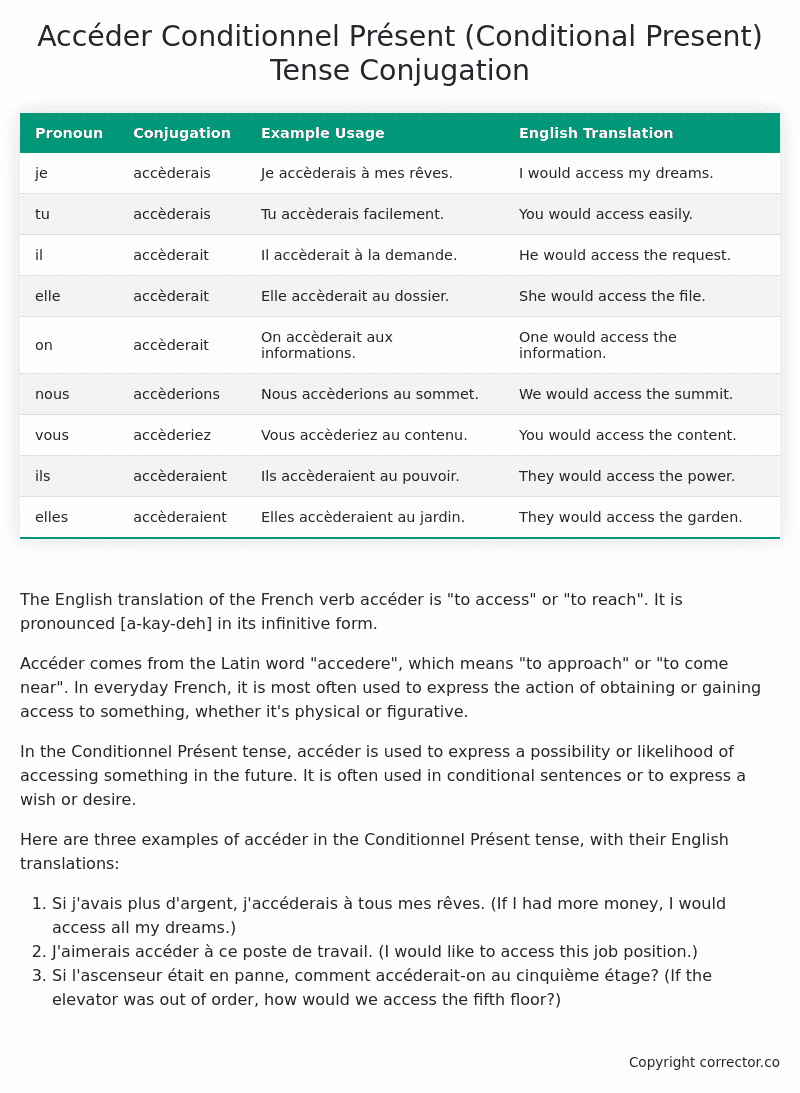Conditionnel Présent (Conditional Present) Tense Conjugation of the French Verb accéder
Introduction to the verb accéder
The English translation of the French verb accéder is “to access” or “to reach”. It is pronounced [a-kay-deh] in its infinitive form.
Accéder comes from the Latin word “accedere”, which means “to approach” or “to come near”. In everyday French, it is most often used to express the action of obtaining or gaining access to something, whether it’s physical or figurative.
In the Conditionnel Présent tense, accéder is used to express a possibility or likelihood of accessing something in the future. It is often used in conditional sentences or to express a wish or desire.
Here are three examples of accéder in the Conditionnel Présent tense, with their English translations:
- Si j’avais plus d’argent, j’accéderais à tous mes rêves. (If I had more money, I would access all my dreams.)
- J’aimerais accéder à ce poste de travail. (I would like to access this job position.)
- Si l’ascenseur était en panne, comment accéderait-on au cinquième étage? (If the elevator was out of order, how would we access the fifth floor?)
Table of the Conditionnel Présent (Conditional Present) Tense Conjugation of accéder
| Pronoun | Conjugation | Example Usage | English Translation |
|---|---|---|---|
| je | accèderais | Je accèderais à mes rêves. | I would access my dreams. |
| tu | accèderais | Tu accèderais facilement. | You would access easily. |
| il | accèderait | Il accèderait à la demande. | He would access the request. |
| elle | accèderait | Elle accèderait au dossier. | She would access the file. |
| on | accèderait | On accèderait aux informations. | One would access the information. |
| nous | accèderions | Nous accèderions au sommet. | We would access the summit. |
| vous | accèderiez | Vous accèderiez au contenu. | You would access the content. |
| ils | accèderaient | Ils accèderaient au pouvoir. | They would access the power. |
| elles | accèderaient | Elles accèderaient au jardin. | They would access the garden. |
Other Conjugations for Accéder.
Le Present (Present Tense) Conjugation of the French Verb accéder
Imparfait (Imperfect) Tense Conjugation of the French Verb accéder
Passé Simple (Simple Past) Tense Conjugation of the French Verb accéder
Passé Composé (Present Perfect) Tense Conjugation of the French Verb accéder
Futur Simple (Simple Future) Tense Conjugation of the French Verb accéder
Futur Proche (Near Future) Tense Conjugation of the French Verb accéder
Plus-que-parfait (Pluperfect) Tense Conjugation of the French Verb accéder
Passé Antérieur (Past Anterior) Tense Conjugation of the French Verb accéder
Futur Antérieur (Future Anterior) Tense Conjugation of the French Verb accéder
Subjonctif Présent (Subjunctive Present) Tense Conjugation of the French Verb accéder
Subjonctif Passé (Subjunctive Past) Tense Conjugation of the French Verb accéder
Subjonctif Imparfait (Subjunctive Imperfect) Tense Conjugation of the French Verb accéder
Subjonctif Plus-que-parfait (Subjunctive Pluperfect) Tense Conjugation of the French Verb accéder
Conditionnel Présent (Conditional Present) Tense Conjugation of the French Verb accéder (this article)
Conditionnel Passé (Conditional Past) Tense Conjugation of the French Verb accéder
L’impératif Présent (Imperative Present) Tense Conjugation of the French Verb accéder
L’infinitif Présent (Infinitive Present) Tense Conjugation of the French Verb accéder
Struggling with French verbs or the language in general? Why not use our free French Grammar Checker – no registration required!
Get a FREE Download Study Sheet of this Conjugation 🔥
Simply right click the image below, click “save image” and get your free reference for the accéder Conditionnel Présent tense conjugation!

Accéder – About the French Conditionnel Présent (Conditional Present) Tense
Formation
Common Everyday Usage Patterns
Expressing Polite Requests
Expressing Hypothetical Situations
Expressing Doubt or Uncertainty
Interactions with Other Tenses
Present Tense
Past Tense
Future Tense
Conditional Perfect
Summary
Want More?
I hope you enjoyed this article on the verb accéder. Still in a learning mood? Check out another TOTALLY random French verb conjugation!


